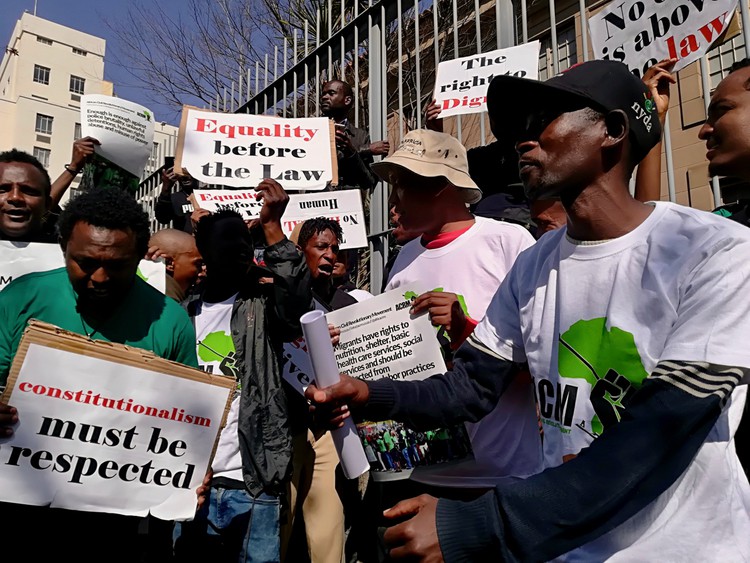Immigrants arrested in JHB raids say they showed police valid papers
Magistrate orders hundreds to be sent to Lindela detention centre
Dozens of people picketed on Monday morning outside the Johannesburg Magistrates’ Court in support of immigrants arrested during police raids in the city centre last week.
Picketers held placards that read: “Equality before the law”, “There is no illegal human” and “We don’t hijack, we are hijacked”. They included people from the African Diaspora Forum, African Civil Revolutionary Movement and members of immigrant communities.
The raids conducted by SAPS and the Johannesburg Metropolitan Police Department targeted shops suspected of selling counterfeit goods. Hundreds of boxes of clothes, shoes and bags were confiscated.
This came after police officers were forced to retreat when they clashed with shop owners and street vendors during an attempted raid in the same area on 1 August.
Home Affairs Minister Aaron Motsoaledi confirmed that 659 foreign nationals had been detained at the Johannesburg Central Prison, of which 117 were documented and 487 were undocumented.
The undocumented cases were heard in court on Monday. Most people were ordered by the court to be taken to Lindela Repatriation Centre and to be deported within 30 days. People with valid documentation were also sent to Lindela pending verification of their documents by Home Affairs.
Teenage Kumbe, leader of African Civil Revolutionary Movement, said the police should have investigated and found the perpetrators of the 1 August clash, “but instead, they mass arrested people and took things from them saying they were counterfeit goods”.
“What proof did they have of this and why did they detain people if it was about counterfeit goods, because some people had papers and showed them to the police,” he said.
About 133 Ethiopian nationals have claimed that they showed police valid documentation. They filed a notice of motion in the Gauteng High Court on 9 August, arguing that they were arrested and detained unlawfully. The Minister of Safety and Security and the Minister of Home Affairs are cited as respondents.
Aerago Someno, the first applicant in the case, described the day of the raid in the court papers. He said he was having breakfast at a restaurant in central Johannesburg on 7 August when police and immigration officers entered the restaurant and demanded to see everyone’s documentation. He said people in the restaurant, including himself, showed the police their identity documents, visas and asylum seeker permits.
“Upon the presentation of our documentation … SAPS and [immigation] officers unlawfully confiscated our documentation and then simply loaded us into police vans … and transported us to the Johannesburg Central Police Station where we were immediately detained without any attempt to verify our documentation,” read the court papers.
Someno said the police had no reason to believe he was in the country illegally.
“I, as do many Ethiopian nationals residing in the Republic of South Africa, do not condone the illegal actions taken by a few foreign nationals residing in and around the Johannesburg CBD. However, nothing can be an excuse for the [police and home affairs] to abuse their authority and act unlawfully,” said Someno.
At the picket, Tadesse Yemane, an Ethiopian trader, said: “Everyone focuses on the retaliation of the shop owners and traders towards the police, but no one asks why they retaliated the way they did. I’m not condoning their actions, but the police have harassed us for many years so I’m sure they were just tired of it.”
He said street vendors and shop owners included South Africans and were not only foreign nationals as the authorities made out.
“We are just trying to make a living in this country because many of us can’t go home … Back home, I wouldn’t have to be selling things on the streets because I can rely on my family. But here, all my bills are on me, so I have to find ways to provide for myself,” said Yemane. “You would think government would realise that we are also contributing to the economy and start to encourage small businesses, not shut us down.”
Support independent journalism
Donate using Payfast

Don't miss out on the latest news
We respect your privacy, and promise we won't spam you.
Next: No internet for over a year at Lwandle public library
Previous: Family of six no longer has to survive on one old age pension
© 2019 GroundUp.
This article is licensed under a Creative Commons Attribution-NoDerivatives 4.0 International License.
You may republish this article, so long as you credit the authors and GroundUp, and do not change the text. Please include a link back to the original article.

